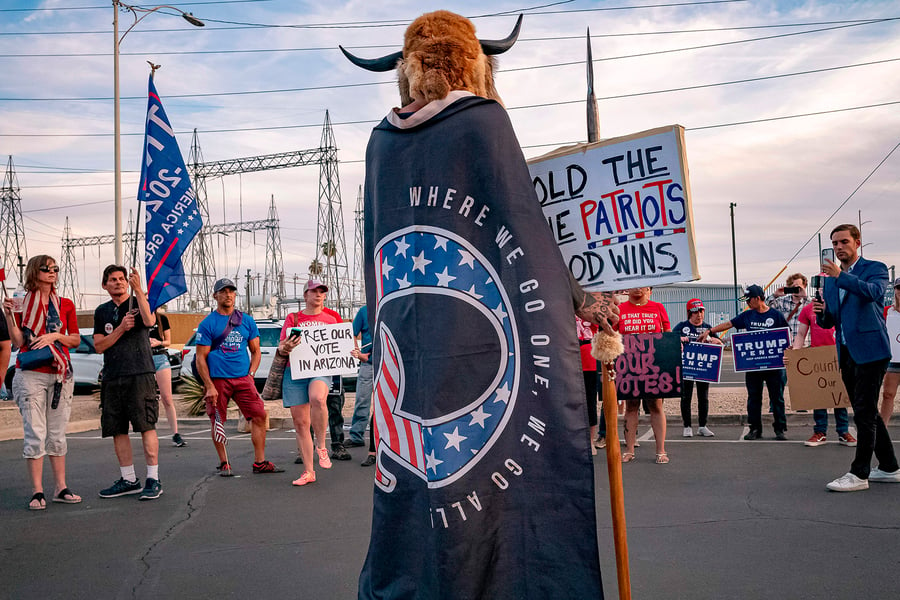Those who follow QAnon, the baseless conspiracy theory positing a deep state plot orchestrated by child-assaulting, Satan-worshipping leftists, are guided by the exhortation to “trust the plan,” an omnipresent mantra to keep faith in the anonymous poster Q and in President Donald J. Trump.
In the days following Election Night, however, as a blue wave began to sweep crucial swing states and cable networks started calling the race for Biden, it was clear on social media that it was becoming increasingly difficult for some supporters to accept the results. “The storm has been coming for a long but never actually arrives. Donald Trump was meant to be bringing the elite down. What is happening?,” one devotee wrote on Twitter on November 9th. “Trust the plan means nothing if there is no plan? I really want to believe and this is getting beyond Cognitive dissonance now.”
That sense of desperation increased as the days wore on and Q remained silent. In itself, this was not all that unusual, as the anonymous poster or posters behind Q have forgone dropping “breadcrumbs,” as they’re called, for at least a month at a time. Yet the abrupt public resignation of Ron Watkins — the administrator of the fringe message board 8kun where Q posts — who has long been believed to be associated with (or even be) Q, fed skepticism about the sustainability of the movement. Though Watkins told the Daily Beast he was resigning as a moderator to focus on his woodworking career, his announcement on Election Day, combined with Q’s silence, raised eyebrows in the extremism-tracking community (though it has not stopped Watkins from actively promoting voting fraud conspiracy theories on his own Twitter account).
Then, yesterday, Q made a much-heralded return, with a simple post: an American flag accompanied by the slogan, “Nothing can stop what is coming. Nothing!” A follow-up post, however, took somewhat of a surprising turn, referring to the question of “how do you ‘safeguard’ US elections post-POTUS” before concluding, “It had to be this way. Sometimes you must walk through the darkness before you can see the light.”
Most of the hardcore believers took this as another reminder to “trust the plan” and desperately cling to claims of election fraud. “They are still thoroughly convinced massive corruption will be revealed and the matter will be taken to the Supreme Court and Trump will serve a second term,” says Travis View, cohost of the podcast QAnon Anonymous.
Others, however, interpreted “post-POTUS” as an admission of defeat. They found it hugely disappointing, and expressed their growing skepticism and discontent in the replies. “Trust the plan you said,” one wrote. “You allowed massive voter fraud. You did nothing…you’re a fucking joke.” “If I were a Q believer, I would have been disappointed, to be honest,” says Aoife Gallagher, analyst at the Institute for Strategic Dialogue. “Quite a number of people are frustrated and looking for guidance.”
But it also was a potential indication that the poster or posters behind Q will be shifting course — a testament to how malleable the movement is, and how its narratives can be contorted to adapt to reality. “Q may be laying the groundwork for a Trump loss, and [providing] avenues for continued growth in the movement,” says Concordia University researcher Marc-Andre Argentino.
It also means the movement isn’t going anywhere anytime soon. That’s particularly true given the congressional wins of candidates Marjorie Taylor Greene and Lauren Boebert, who have previously endorsed the theory; though Boebert has somewhat retracted her support, Greene has not, creating a small schism within the GOP. The movement also gained tremendous traction last year with the mainstreaming of #SaveTheChildren, an anti-trafficking campaign that was coopted by conspiracy theorists last summer. The campaign was hugely effective at drawing mainstream lifestyle influencers, particularly women, into the movement, hugely expanding QAnon’s audience. “Even without a Trump presidency, those kinds of Save the Children movements and QAnon lite movements will continue to prevail,” predicts Gallagher.
Since lockdown, the QAnon community has also benefited from an increasing international presence, with researcher Marc-Andre Argentino tracking groups in more than 70 countries, including Germany and Brazil, as of October. Such international communities provide multiple pathways for QAnon to flourish beyond in a Trump administration-led United States. So, too, does the recent trend of large social networks like Facebook and Twitter deplatforming believers, prompting them to flock to other, less-moderated social networks like Gab and Parler, where extremists of all stripes congregate, creating the potential for cross-pollination. “These movements tend to be infiltrated by other movements that are violent, which is really what we’re concerned about,” says Kevin Grisham, associate director for the Center for the Study of Hate and Extremism. “If that happens, that can be very deadly.”
As a Joe Biden administration becomes imminent, some of the new supporters who gravitated to the movement are likely to become disillusioned and drop off. “There is a chance people will lose faith and that is likely the low-hanging fruits,” says Argentino. Those who remain, however, “will be even more committed to the cause, which makes them more dangerous.” That’s especially worrisome as the diehards, as well as major QAnon influencers who have built brands on the continued growth of the conspiracy theory, continue to cling to the prospects of a Trump victory, even as they rapidly recede into the ether. “The more lies and propaganda the media sends out about Joe Biden being the President, the more they are starting to panic,” one major QAnon influencer tweeted. “This is going to be absolutely EPIC! Trust the Plan! Patriots in Control!”
“There’s been this mindset that Biden’s won, so we don’t have a problem with QAnon anymore,” says Grisham. “That’s wishful thinking.”
From Rolling Stone US





































